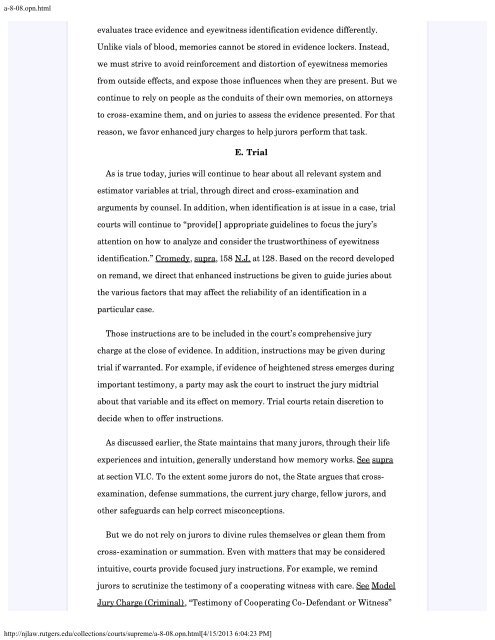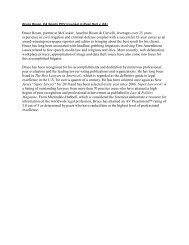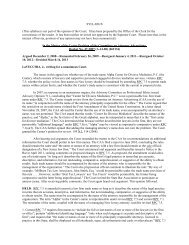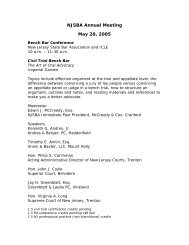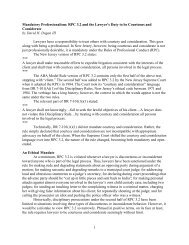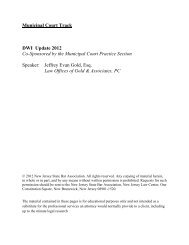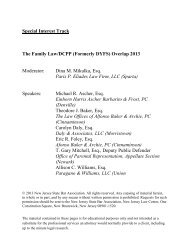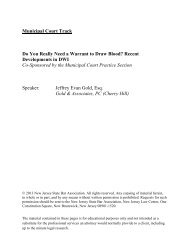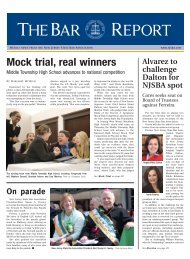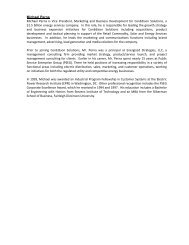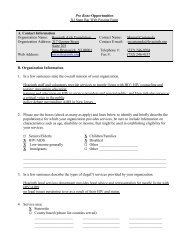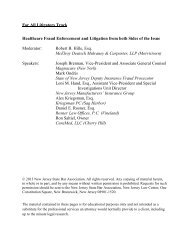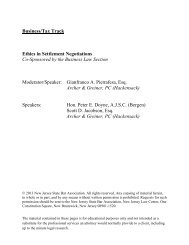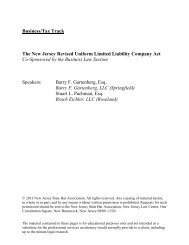State v. Henderson and the New Model Jury Charges - New Jersey ...
State v. Henderson and the New Model Jury Charges - New Jersey ...
State v. Henderson and the New Model Jury Charges - New Jersey ...
Create successful ePaper yourself
Turn your PDF publications into a flip-book with our unique Google optimized e-Paper software.
a-8-08.opn.html<br />
evaluates trace evidence <strong>and</strong> eyewitness identification evidence differently.<br />
Unlike vials of blood, memories cannot be stored in evidence lockers. Instead,<br />
we must strive to avoid reinforcement <strong>and</strong> distortion of eyewitness memories<br />
from outside effects, <strong>and</strong> expose those influences when <strong>the</strong>y are present. But we<br />
continue to rely on people as <strong>the</strong> conduits of <strong>the</strong>ir own memories, on attorneys<br />
to cross-examine <strong>the</strong>m, <strong>and</strong> on juries to assess <strong>the</strong> evidence presented. For that<br />
reason, we favor enhanced jury charges to help jurors perform that task.<br />
E. Trial<br />
As is true today, juries will continue to hear about all relevant system <strong>and</strong><br />
estimator variables at trial, through direct <strong>and</strong> cross-examination <strong>and</strong><br />
arguments by counsel. In addition, when identification is at issue in a case, trial<br />
courts will continue to “provide[] appropriate guidelines to focus <strong>the</strong> jury’s<br />
attention on how to analyze <strong>and</strong> consider <strong>the</strong> trustworthiness of eyewitness<br />
identification.” Cromedy, supra, 158 N.J. at 128. Based on <strong>the</strong> record developed<br />
on rem<strong>and</strong>, we direct that enhanced instructions be given to guide juries about<br />
<strong>the</strong> various factors that may affect <strong>the</strong> reliability of an identification in a<br />
particular case.<br />
Those instructions are to be included in <strong>the</strong> court’s comprehensive jury<br />
charge at <strong>the</strong> close of evidence. In addition, instructions may be given during<br />
trial if warranted. For example, if evidence of heightened stress emerges during<br />
important testimony, a party may ask <strong>the</strong> court to instruct <strong>the</strong> jury midtrial<br />
about that variable <strong>and</strong> its effect on memory. Trial courts retain discretion to<br />
decide when to offer instructions.<br />
As discussed earlier, <strong>the</strong> <strong>State</strong> maintains that many jurors, through <strong>the</strong>ir life<br />
experiences <strong>and</strong> intuition, generally underst<strong>and</strong> how memory works. See supra<br />
at section VI.C. To <strong>the</strong> extent some jurors do not, <strong>the</strong> <strong>State</strong> argues that crossexamination,<br />
defense summations, <strong>the</strong> current jury charge, fellow jurors, <strong>and</strong><br />
o<strong>the</strong>r safeguards can help correct misconceptions.<br />
But we do not rely on jurors to divine rules <strong>the</strong>mselves or glean <strong>the</strong>m from<br />
cross-examination or summation. Even with matters that may be considered<br />
intuitive, courts provide focused jury instructions. For example, we remind<br />
jurors to scrutinize <strong>the</strong> testimony of a cooperating witness with care. See <strong>Model</strong><br />
<strong>Jury</strong> Charge (Criminal), “Testimony of Cooperating Co-Defendant or Witness”<br />
http://njlaw.rutgers.edu/collections/courts/supreme/a-8-08.opn.html[4/15/2013 6:04:23 PM]


